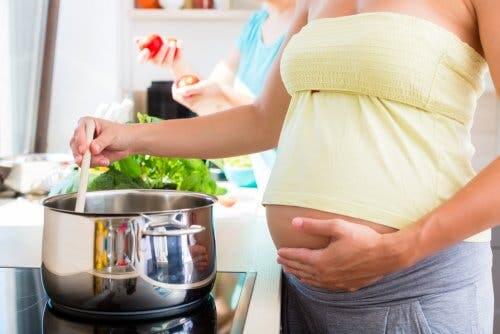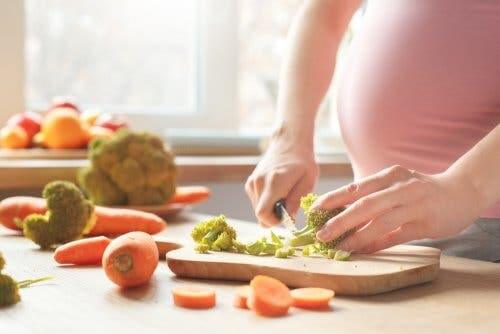The Importance of Food Safety During Pregnancy


Written and verified by the nutritionist Marta Guzmán
It’s extremely important to practice food safety during pregnancy to prevent certain risks. While infrequent, there are certain illnesses that can be transmitted through food and have negative consequences both on pregnant women and the developing fetus. Therefore, basic hygiene measures and avoiding certain foods are fundamental.
Keep reading to find out more.
Food safety during pregnancy
During gestation, exposure to certain food-borne illnesses can have serious consequences for unborn babies:
- Listeria: This is an illness that results from the bacteria listeria monocytogenes, which is able to live and reproduce in certain foods. While this infection is uncommon, it poses a greater danger for pregnant women. That’s because its effects can be serious for unborn babies and newborns.
- Toxoplasmosis: Here, we’re looking at an illness caused by the parasite toxoplasma gondii, which is found in many foods, as well as in cat feces. Like listeria, toxoplasmosis can have serious effects on the health of the future baby.
Fortunately, these and other food-related risked are preventable. And this is where the importance of food safety during pregnancy comes in. In other words, practicing hygiene recommendations and avoiding certain foods, which we’ll mention further below.
Basic food hygiene recommendations
Wash your hands well
To guarantee food safety during pregnancy, handwashing is key. Pregnant women should wash their hands frequently with soap and warm water for at least 20 seconds. This is important before and after handling foods, after being in contact with any dirty materials (diapers, garbage, animals), and especially after using the bathroom.

Thoroughly clean and wash the following:
- Counters and other surfaces where you’ll be setting down food.
- The inside of the refrigerator regularly and especially after spills.
- Kitchen equipment (containers, cutting boards, silverware, dishes, etc) as well as dish towels and sponges.
- After handling raw meats (fish, chicken, beef, etc). This should involve washing and disinfecting utensils, cutting boards, countertops, etc.
Food safety during pregnancy: Separating and protecting foods
Inside and outside the refrigerator:
- Keep raw foods away from those that are ready to eat to prevent contact between the two.
- It’s important to keep foods in closed containers, preferably in airtight glass containers. Store them for as little time as possible.
Store foods appropriately
- Make a point to eat foods right after cooking them.
- Don’t leave raw or cooked foods at room temperature. Store perishable foods and leftovers in the freezer or refrigerator if you’re not going to eat them right away.
- Avoid the reproduction of listeria by maintaining your refrigerator temperature at a maximum of 39ºF.
- Don’t thaw foods at room temperature. It’s best to allow foods to thaw in the refrigerator or, in the case of small pieces, thaw them in the microwave or cook them directly.
- Read the labels on packaged foods and follow manufacturers’ instructions regarding their conservation and expiration date.
Precautions regarding specific foods
Food safety during pregnancy: Washing fruits and vegetables
Fruits and vegetables can be a source of contamination, mainly from being in contact with dirt and animal excrement (cats, rodents, etc). To avoid risks:
- Start by cutting off any damaged areas.
- Wash fruits and vegetables well under cold running water. This is important even for fruits and vegetables that you plan on peeling because it prevents contamination when the knife/peeler passes through.

- When consuming raw vegetables (lettuce, tomatoes, spinach, cucumbers, carrots, etc) or fresh, unpeeled fruits (grapes, cherries, strawberries, apricots, etc) you should soak them in clean water for 5 minutes with a few drops of bleach. Be sure to use bleach that’s safe for disinfecting food, and rinse with abundant running water before consuming.
- Wash aromatic herbs (parsley, rosemary, basil, etc) and sprouts (soy, alfalfa, etc) before eating.
Cook foods completely
To guarantee food safety during pregnancy, it’s important to stew, cook, grill, or fry foods completely. Pregnant women should never consume any foods that are even a bit raw on the inside. This is especially important in the case of seafood, eggs, fish, hamburgers, poultry, pork, and other meats. The same is true when it comes to cooking foods that contain these ingredients (pizza, empanadas, stuffed shells, etc).
- Cooked meats shouldn’t have any pink areas inside.
- When cooking poultry, be sure the meat is easy to separate from the bone.
- In the case of fish, test to see if the central bone separates easily and that the color of the meat has changed. In most types of fish, it will turn white.
- When cooking liquid foods like soups, creams, sauces, stews, etc, make sure to bring them to a boil.
- If you use a microwave, place a cover over foods. Also, be sure to set the device for the right time and power level to make sure to completely cook or heat your food.
- When consuming leftovers from the refrigerator, make sure to heat them well before eating. They should boil or steam and become very hot.
It’s extremely important to practice food safety during pregnancy to prevent certain risks. While infrequent, there are certain illnesses that can be transmitted through food and have negative consequences both on pregnant women and the developing fetus. Therefore, basic hygiene measures and avoiding certain foods are fundamental.
Keep reading to find out more.
Food safety during pregnancy
During gestation, exposure to certain food-borne illnesses can have serious consequences for unborn babies:
- Listeria: This is an illness that results from the bacteria listeria monocytogenes, which is able to live and reproduce in certain foods. While this infection is uncommon, it poses a greater danger for pregnant women. That’s because its effects can be serious for unborn babies and newborns.
- Toxoplasmosis: Here, we’re looking at an illness caused by the parasite toxoplasma gondii, which is found in many foods, as well as in cat feces. Like listeria, toxoplasmosis can have serious effects on the health of the future baby.
Fortunately, these and other food-related risked are preventable. And this is where the importance of food safety during pregnancy comes in. In other words, practicing hygiene recommendations and avoiding certain foods, which we’ll mention further below.
Basic food hygiene recommendations
Wash your hands well
To guarantee food safety during pregnancy, handwashing is key. Pregnant women should wash their hands frequently with soap and warm water for at least 20 seconds. This is important before and after handling foods, after being in contact with any dirty materials (diapers, garbage, animals), and especially after using the bathroom.

Thoroughly clean and wash the following:
- Counters and other surfaces where you’ll be setting down food.
- The inside of the refrigerator regularly and especially after spills.
- Kitchen equipment (containers, cutting boards, silverware, dishes, etc) as well as dish towels and sponges.
- After handling raw meats (fish, chicken, beef, etc). This should involve washing and disinfecting utensils, cutting boards, countertops, etc.
Food safety during pregnancy: Separating and protecting foods
Inside and outside the refrigerator:
- Keep raw foods away from those that are ready to eat to prevent contact between the two.
- It’s important to keep foods in closed containers, preferably in airtight glass containers. Store them for as little time as possible.
Store foods appropriately
- Make a point to eat foods right after cooking them.
- Don’t leave raw or cooked foods at room temperature. Store perishable foods and leftovers in the freezer or refrigerator if you’re not going to eat them right away.
- Avoid the reproduction of listeria by maintaining your refrigerator temperature at a maximum of 39ºF.
- Don’t thaw foods at room temperature. It’s best to allow foods to thaw in the refrigerator or, in the case of small pieces, thaw them in the microwave or cook them directly.
- Read the labels on packaged foods and follow manufacturers’ instructions regarding their conservation and expiration date.
Precautions regarding specific foods
Food safety during pregnancy: Washing fruits and vegetables
Fruits and vegetables can be a source of contamination, mainly from being in contact with dirt and animal excrement (cats, rodents, etc). To avoid risks:
- Start by cutting off any damaged areas.
- Wash fruits and vegetables well under cold running water. This is important even for fruits and vegetables that you plan on peeling because it prevents contamination when the knife/peeler passes through.

- When consuming raw vegetables (lettuce, tomatoes, spinach, cucumbers, carrots, etc) or fresh, unpeeled fruits (grapes, cherries, strawberries, apricots, etc) you should soak them in clean water for 5 minutes with a few drops of bleach. Be sure to use bleach that’s safe for disinfecting food, and rinse with abundant running water before consuming.
- Wash aromatic herbs (parsley, rosemary, basil, etc) and sprouts (soy, alfalfa, etc) before eating.
Cook foods completely
To guarantee food safety during pregnancy, it’s important to stew, cook, grill, or fry foods completely. Pregnant women should never consume any foods that are even a bit raw on the inside. This is especially important in the case of seafood, eggs, fish, hamburgers, poultry, pork, and other meats. The same is true when it comes to cooking foods that contain these ingredients (pizza, empanadas, stuffed shells, etc).
- Cooked meats shouldn’t have any pink areas inside.
- When cooking poultry, be sure the meat is easy to separate from the bone.
- In the case of fish, test to see if the central bone separates easily and that the color of the meat has changed. In most types of fish, it will turn white.
- When cooking liquid foods like soups, creams, sauces, stews, etc, make sure to bring them to a boil.
- If you use a microwave, place a cover over foods. Also, be sure to set the device for the right time and power level to make sure to completely cook or heat your food.
- When consuming leftovers from the refrigerator, make sure to heat them well before eating. They should boil or steam and become very hot.
All cited sources were thoroughly reviewed by our team to ensure their quality, reliability, currency, and validity. The bibliography of this article was considered reliable and of academic or scientific accuracy.
- Agencia Española de Seguridad Alimentaria y Nutrición (AECOSAN). Alimentación segura durante el embarazo. Departamento de Consumo. Gobierno de Madrid.
- Agencia Catalana de Seguridad Alimentaria. La seguridad alimentaria durante el embarazo. Departamento de Salud de Cataluña. Marzo 2021.
- Centros para el Control y la Prevención de Enfermedades. Listeria (listeriosis). Departamento de Salud y Servicios Sociales de Estados Unidos. Junio 2017
- Centros para el Control y la Prevención de Enfermedades. Toxoplasmosis Pregnancy FAQS. Departamento de Salud y Servicios Sociales de Estados Unidos. Septiembre 2020.
- Gobierno de Cantabria. La seguridad alimentaria durante el embarazo.
- U.S Food&Drug Administration. Seguridad Alimentaria para futuras mamas. Septiembre 2018.
This text is provided for informational purposes only and does not replace consultation with a professional. If in doubt, consult your specialist.








